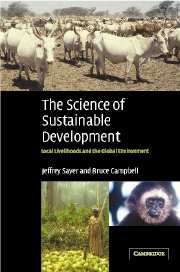Book contents
- Frontmatter
- Contents
- List of figures
- List of boxes
- List of tables
- Foreword
- Preface
- Acknowledgements
- Part I Integrating natural resource management
- 1 The challenge: alleviating poverty and conserving the environment
- 2 Dealing with complexity
- 3 Getting into the system: multiple realities, social learning and adaptive management
- 4 Issues of scale
- 5 Models, knowledge and negotiation
- Part II Realities on the ground
- Part III The research–management continuum
- Bibliography
- Index
3 - Getting into the system: multiple realities, social learning and adaptive management
Published online by Cambridge University Press: 18 May 2010
- Frontmatter
- Contents
- List of figures
- List of boxes
- List of tables
- Foreword
- Preface
- Acknowledgements
- Part I Integrating natural resource management
- 1 The challenge: alleviating poverty and conserving the environment
- 2 Dealing with complexity
- 3 Getting into the system: multiple realities, social learning and adaptive management
- 4 Issues of scale
- 5 Models, knowledge and negotiation
- Part II Realities on the ground
- Part III The research–management continuum
- Bibliography
- Index
Summary
One thing sets humans apart from other organisms: they are very good at learning and adapting. The farmers, foresters and fishers who are the supposed beneficiaries of natural resources research are constantly experimenting and innovating. The persistent failure of formal research and development assistance projects to recognise this reality is, therefore, something of a surprise. Far too many researchers and development practitioners act as though resource users are passive recipients of new ideas and technologies developed in the laboratory or on the research station. In the previous chapter, we argued that farmers are more sensitive to many elements of the complexity of their environment than many researchers. In this chapter, we extend this argument to the issues of innovation and adaptation. We contend that farmers' judgements of which innovations are viable and which are not will often differ from, and may be better than, those of the scientists. Furthermore, farmers are past masters at adaptation. They are constantly reading the faint signals that they receive from their environment – the date when a migrant bird arrives, the weather at a certain phase of the moon – and adapting their agricultural calendar or choice of crop accordingly.
Development projects and research institutes have been stubborn in their unwillingness to accept the realities of learning and adaptation by farmers and other resource managers. Typically, teams of consultants characterise and diagnose resource management problems.
Information
- Type
- Chapter
- Information
- The Science of Sustainable DevelopmentLocal Livelihoods and the Global Environment, pp. 55 - 78Publisher: Cambridge University PressPrint publication year: 2003
